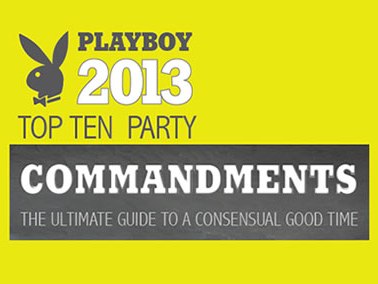When feminist group FORCE: Upsetting Rape Culture created a parody site posing as Playboy magazine, Playboy was quick to complain to the activists and their Internet service provider. The crux of Playboy's complaint? The activists had used the Playboy name and logo.
You’d think a controversial publisher like Playboy would recognize the importance of respecting free speech. But when feminist group FORCE: Upsetting Rape Culture created a parody site posing as the magazine, Playboy was quick to complain to the activists and their Internet service provider, May First/People Link. The crux of Playboy’s complaint? The activists had used the Playboy name and logo.
The parody site was intended to raise awareness about the importance of consent and resisting what the activists call “rape culture.” The campaign is funny, smart, and even educational. It was also immediately recognized by the press for the parody that it was.
So we figured this had to be a misunderstanding. EFF responded, explaining that the spoof was protected by First Amendment and other legal doctrines. We urged the company to withdraw its demand, and accept FORCE’s invitation to participate in—rather than fight—the movement to raise awareness about the importance of consent. From our letter:
As a news publication that has been involved in its share of controversy, we would expect Playboy to do its best to support political speech, rather than shutting it down. In addition, this political spoof is obviously designed to raise awareness about an important problem, one that we would hope Playboy would want to highlight as well.
Sadly, FORCE and May First/People Link are both familiar with the use of legal threats to attempt to quash legitimate speech. Victoria’s Secret took aim last year at a FORCE campaign called PINK Loves Consent. And in a case of government overreach, the FBI seized a May First/People Link server that had been used to facilitate anonymous speech.
In all of these cases, the silencing tactics follow the same script: locate and target the weakest link in the chain between the speaker and the audience. FORCE and May First/People Link may be willing to stand up to Playboy, but there’s no guarantee that the same is true of the other intermediaries—like their upstream hosting provider.
Playboy is generally vocal about its commitment to freedom of speech and the First Amendment. Every year since 1979, the Hugh M. Hefner First Amendment Award—named after the magazine’s founder—is granted at the Playboy Mansion. (It has been awarded to three EFF employees and EFF co-founder John Perry Barlow.) And the October issue even features an article praising so-called “hacktivists” for protecting and promoting online free speech. So it’s puzzling and disappointing to see the organization step back from that commitment as soon as that speech includes its name.
We have posted our response in full. Here’s the short version: Dear Playboy, You can stand up for free speech and consent, or take the same maximalist approach that has led to so many shameful online takedowns. Do the right thing.



